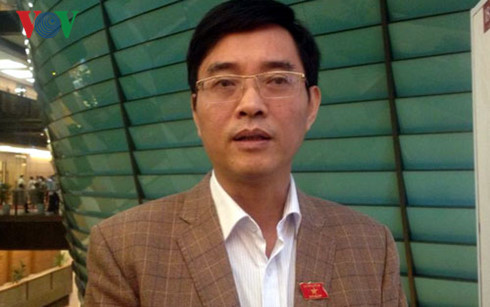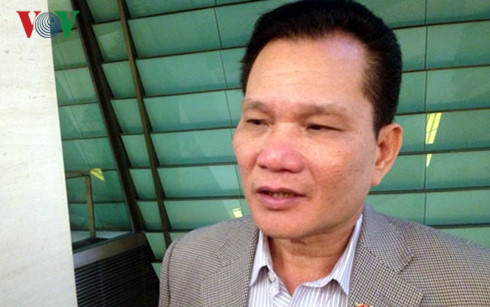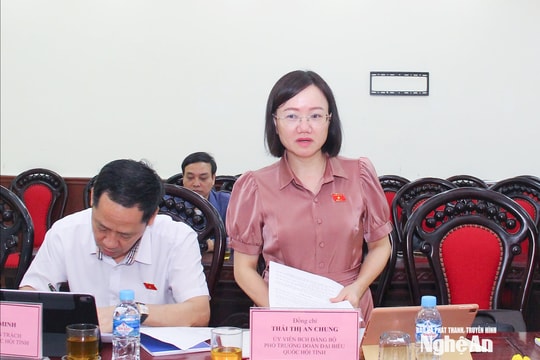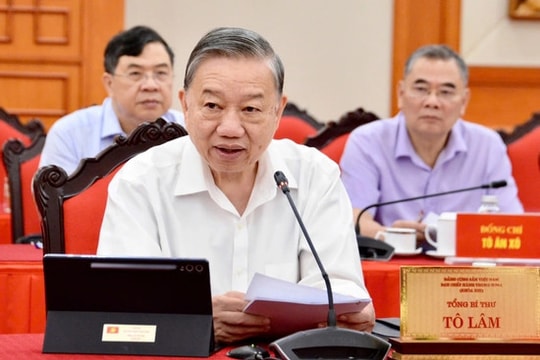The time of civil servants 'sitting around and enjoying high salaries' is over
National Assembly Delegate Bui Sy Loi: The principle of salary is to work according to capacity and pay according to quantity and quality of labor.
National Assembly deputies openly condemned civil servants who do not contribute anything to their agencies, sit idle and demand high salaries. This is also one of the hot topics that the Minister of Home Affairs will answer during the live question and answer session.
High salaries for energetic and efficient workers
In the hallway of the National Assembly, talking to VOV.VN, National Assembly Deputy Hoang Quang Ham (Phu Tho delegation) said: Currently, many state agencies pay salaries based on productivity and work efficiency rather than seniority. The more developed the country is, the more it is impossible for you to rely on seniority in a state agency, not creating labor productivity, working inefficiently, and still demand a much higher salary than those who work very hard and have higher work efficiency. That is unfair.
 |
| National Assembly Deputy Hoang Quang Ham |
If we do not encourage people to work hard and receive a fair salary, they will feel dissatisfied. Working in the government is like being an employee, if the agency does not pay them a salary that is commensurate with the effort they put in, they will move to another agency immediately. This will lead to a brain drain.
Mr. Hoang Quang Ham said, we are implementing pay based on output results. Firstly, we are approaching output budget, administrative spending and public autonomy. More specifically, we are paying additional income to those who have higher contributions.
Delegate Ham also admitted that in the operation of the public apparatus, there is still a group of civil servants who do not meet job requirements but still demand high salaries.
Currently, many units are still dividing salaries on average, at most they are ranked A, B, C and are not clearly defined. In the salary regulations, such as state units, the increase is not more than once, but once is the average salary fund, some people will not get any money and some people can even get 10 times because they have high contributions.
“When I was working at the State Audit, I often managed civil servants based on work efficiency as the top priority. Ensuring that my colleagues work 8 hours at the office is a compliance with administrative discipline. I assigned work to my colleagues and often gave them a time to complete it. If they were late, did not submit it on time or were late, I reminded them.
If you submit on time but the results are not guaranteed, I just say not to lose faith. If you do well, I will promptly reward and encourage you. We must determine work efficiency based on the results of the task, not just sitting for 8 administrative hours to finish the job" - Deputy Ham said.
Does a salary increase mean downsizing?
National Assembly Deputy Bui Sy Loi (Thanh Hoa delegation) said: the responsibility of agencies is to pay salaries publicly, transparently, and in accordance with the law. According to Mr. Loi, our civil servant staff is too large, if we do not streamline the payroll and arrange staff according to job positions, no matter how large the civil servant staff is, salary reform will not be possible.
 |
| National Assembly Delegate Bui Sy Loi |
Mr. Loi analyzed that we must move 2.3 million people working in the public sector to autonomy, self-responsibility and contract according to output costs, and cannot leave it as it is now.
Currently, our salary policy has “missed its appointment” with civil servants three times. Conclusion 63 of the Politburo, Resolution 5 of the Central Committee, Resolution 7 of the 11th session and Resolution 12 of the 12th session also mentioned reforming the salary policy, but we have not been able to reform it.
Therefore, the Ministry of Home Affairs must advise the Government to implement synchronous solutions to comprehensively reform the salary policy. That means reforming the basic salary policy to ensure the lives of civil servants, reforming the salary scale, salary table, and salary multiples to follow the spirit of distribution according to labor.
The principle of salary is to work according to ability, pay according to quantity and quality of labor. Salary is a lever to increase labor productivity and consider investment in salary as investment in development. Only then can we have a wholehearted civil service (i.e., public servants).
If we do not reform the salary policy, there will be stories of "hunger eats secretly, poverty makes trouble". If you do not fight and maintain the nature of a cadre and party member, it will lead to corruption and negativity. That is an issue that we should pay attention to and consider. We evaluate cadres on both sides, improve their capacity and qualities, but we also have to give them enough to live so that they can wholeheartedly devote themselves to their work.
Many agencies have rotated cadres and civil servants according to their capacity and suitability for their positions and jobs. However, there are also many places that cannot do that. For example, an officer is a department head but there is no way to promote them to deputy department head.
There are civil servants who steal time and do not work enough hours.
National Assembly Deputy Hoang Quang Ham emphasized: The responsibility of the Ministry of Home Affairs is to issue guidelines and effectively implement the project of streamlining the payroll, at the same time inspect, strictly handle, and advise the government to strictly handle cases of violations of not properly implementing the payroll streamlining roadmap.
In streamlining the payroll, the Politburo will decide to reduce some agencies. Reduce civil servants who do not meet the requirements and do not complete their tasks or those who prefer to retire early. The newly established agencies are not rigid but the reduction must be carried out in all agencies.
However, Deputy Ham is worried because it is very difficult for us to reduce the number of people in state agencies because every year they are excellent and progressive. Many people who do business very "foolishly" are also excellent and progressive, so how can we reduce them? Therefore, there are two problems here: the criteria to evaluate civil servants and the leaders can know best who can do the job and who cannot do the job. How much can they do, is it suitable for their ability or not?
Therefore, according to Deputy Ham, each civil servant must also seriously implement the regulations. During the evaluation sessions, we must be frank with each other and have a receptive spirit, clearly pointing out the shortcomings and inadequacies of our colleagues.
According to VOV




.jpg)



